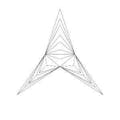/*
++ 6 STEP SEQUENCER ++
DESCRIPTION:
Reads values from 6 potentiometers to change the pitch of any step of the sequencer tone generator.
Change the pitch of each step with a potentiometer.
CIRCUIT:
Connect a speaker or piezo to pin number 13 and to ground;
Connect the first lead of a potentiometer to 5v and the last to ground, the one in the middle to Analog Input pin 0;
(Repeat for all the four potentiometers connecting the middle lead to Analog Input pins 0, 1, 2, 3, 4, 5);
Connect a switch from digital port 3 and ground, put a 220 Ohm Resistor between the digital port 3 and 5V;
For more information follow this link: http://www.artislab.it/it/step-sequencer/
This example code is for educational purpose and it is in the public domain.
Author: Costantino Rizzuti 2016
Derived by a previous sketch made by Alessandro Contini & Paolo Cavagnolo
*/
// Tones table definition
#define NOTE_B0 31
#define NOTE_C1 33
#define NOTE_CS1 35
#define NOTE_D1 37
#define NOTE_DS1 39
#define NOTE_E1 41
#define NOTE_F1 44
#define NOTE_FS1 46
#define NOTE_G1 49
#define NOTE_GS1 52
#define NOTE_A1 55
#define NOTE_AS1 58
#define NOTE_B1 62
#define NOTE_C2 65
#define NOTE_CS2 69
#define NOTE_D2 73
#define NOTE_DS2 78
#define NOTE_E2 82
#define NOTE_F2 87
#define NOTE_FS2 93
#define NOTE_G2 98
#define NOTE_GS2 104
#define NOTE_A2 110
#define NOTE_AS2 117
#define NOTE_B2 123
#define NOTE_C3 131
#define NOTE_CS3 139
#define NOTE_D3 147
#define NOTE_DS3 156
#define NOTE_E3 165
#define NOTE_F3 175
#define NOTE_FS3 185
#define NOTE_G3 196
#define NOTE_GS3 208
#define NOTE_A3 220
#define NOTE_AS3 233
#define NOTE_B3 247
#define NOTE_C4 262
#define NOTE_CS4 277
#define NOTE_D4 294
#define NOTE_DS4 311
#define NOTE_E4 330
#define NOTE_F4 349
#define NOTE_FS4 370
#define NOTE_G4 392
#define NOTE_GS4 415
#define NOTE_A4 440
#define NOTE_AS4 466
#define NOTE_B4 494
#define NOTE_C5 523
#define NOTE_CS5 554
#define NOTE_D5 587
#define NOTE_DS5 622
#define NOTE_E5 659
#define NOTE_F5 698
#define NOTE_FS5 740
#define NOTE_G5 784
#define NOTE_GS5 831
#define NOTE_A5 880
#define NOTE_AS5 932
#define NOTE_B5 988
#define NOTE_C6 1047
#define NOTE_CS6 1109
#define NOTE_D6 1175
#define NOTE_DS6 1245
#define NOTE_E6 1319
#define NOTE_F6 1397
#define NOTE_FS6 1480
#define NOTE_G6 1568
#define NOTE_GS6 1661
#define NOTE_A6 1760
#define NOTE_AS6 1865
#define NOTE_B6 1976
#define NOTE_C7 2093
#define NOTE_CS7 2217
#define NOTE_D7 2349
#define NOTE_DS7 2489
#define NOTE_E7 2637
#define NOTE_F7 2794
#define NOTE_FS7 2960
#define NOTE_G7 3136
#define NOTE_GS7 3322
#define NOTE_A7 3520
#define NOTE_AS7 3729
#define NOTE_B7 3951
#define NOTE_C8 4186
#define NOTE_CS8 4435
#define NOTE_D8 4699
#define NOTE_DS8 4978
// Declaration of tones used in the sequencer
// Define here the note you want to play.
// The first notes are mapped to the lowest position of the pots
int pitch[] = {
NOTE_C3,
NOTE_GS3,
NOTE_CS3,
NOTE_AS3,
NOTE_A3,
NOTE_B3,
NOTE_F4,
NOTE_DS4,
NOTE_E4,
NOTE_G3,
NOTE_D4,
NOTE_FS4};
// Declaration of variables
int speaker = 9; // Speaker output pin
int k=0; // Variable to store the value of the loop
int POT1 = A0; // POT1 pin
int POT2 = A1; // POT2 pin
int POT3 = A2; // POT3 pin
int POT4 = A3; // POT4 pin
int POT5 = A4; // POT5 pin
int POT6 = A5; // POT6 pin
int ReadPot1,ReadPot2,ReadPot3,ReadPot4,ReadPot5,ReadPot6; // Variable to store the value of the pots
// Variables used to calculate tempo
// set BPM
int bpm=180;
// set Subdivision 1=quarter note; 0.5 ->eight note, ....
float subdivision=1;
//Define here the sequence of durations
//-> 1->quarter note; 0.5 ->eight note, ....
float D[] = {1, 0.5, 0.5, 0.333, 0.333, 0.333}; //3/4 pattern
//float D[] = {1, 0.5, 0.5, 1,0.5, 0.5}; //4/4 pattern
// The lenght of the D array
int NDuration=6;
int DurCount=0;
int value[] = {0, 0, 0, 0, 0, 0}; // value to define the discrete interval of tune using the pot
int note[] = {0, 0, 0, 0, 0, 0};
int interval;
void setup() {
pinMode(3, INPUT);
//Period computed according bpm and subdivision
interval = 60000/(subdivision*bpm);
}
void loop() {
if(digitalRead(3)==HIGH){
for (k = 0; k <= 5; k++) { // Cycle on each pot
value[k] = map(analogRead(k), 0, 1023, 0, 2500); // Mapping the value of the Potentiometer to have a wider range of values
if ((value[k]>=0) && (value[k]<100)) // Discretization of the pot intervals - in order to assign the note
note[k] = 0;
if ((value[k]>=100) && (value[k]<300))
note[k] = pitch[0];
if ((value[k]>=300) && (value[k]<500))
note[k] = pitch[1];
if ((value[k]>=500) && (value[k]<700))
note[k] = pitch[2];
if ((value[k]>=700) && (value[k]<900))
note[k] = pitch[3];
if ((value[k]>=900) && (value[k]<1100))
note[k] = pitch[4];
if ((value[k]>=1100) && (value[k]<1300))
note[k] = pitch[5];
if ((value[k]>=1300) && (value[k]<1500))
note[k] = pitch[6];
if ((value[k]>=1500) && (value[k]<1700))
note[k] = pitch[7];
if ((value[k]>=1700) && (value[k]<=1900))
note[k] = pitch[8];
if ((value[k]>=1900) && (value[k]<=2100))
note[k] = pitch[9];
if ((value[k]>=2100) && (value[k]<=2300))
note[k] = pitch[10];
if ((value[k]>=2300) && (value[k]<=2500))
note[k] = pitch[11];
float Duration=D[DurCount]*interval;
tone(speaker, note[k], Duration); // Play the note
DurCount++;
if(DurCount>=NDuration)DurCount=0;
delay(Duration);
}
}
}
_ztBMuBhMHo.jpg?auto=compress%2Cformat&w=48&h=48&fit=fill&bg=ffffff)















Comments
Please log in or sign up to comment.